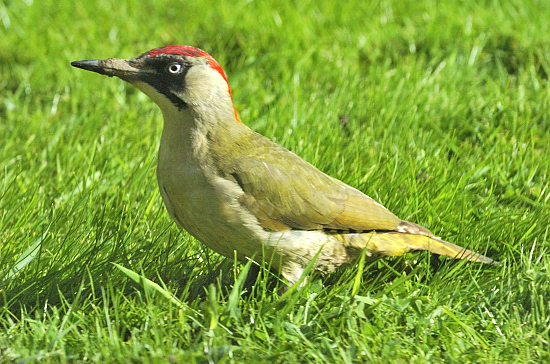Article
Green Woodpecker
Latin Name: Picus Viridis
The Green Woodpecker is a member of the woodpecker
family of which there are 4 subspecies and most occur in most parts of Europe
and western Asia. It is the largest of the 3 woodpeckers found in the UK. It has
a heavy looking body, short tail and a strong long bill.
It spends much of it's time feeding on ants on the
ground and does not often 'drum' on trees, however they do have a loud call. |

 A Female Green Woodpecker
A Female Green Woodpecker |
|
It is a shy bird and although I grew up in the
countryside I in fact had never seen a Green Woodpecker until a few years back
when we lived in a farmhouse in the country and they were regular visitors to
our garden, both adults and their young. All I can say is there must have been a
good supply of ants in that garden.
We have loads of photographs
which were mainly taken from inside our house, as soon as they heard a noise
they would fly off. See our gallery for some of images we have -
Green Woodpecker Gallery.
Identification
From the other
woodpeckers it is identifiable from it's green back, pale yellow belly, a red
crown on it's head and its black moustache stripe, which in males has a red
stripe in it, whereas in females it is all black. Both sexes are green and from
a distance will look similar, on closer inspection it is the red strip in the
black area on the head that signifies it is a male. Juveniles are spotty and
streaked all over with a dark moustache initially until the red feathers start
to show. Their beak is used for pecking in soft wood and for getting into the
soft ground for it's food. However they have very long tongues (10cm) and has to
be curled around it's skull, it is coated with sticky secretions from the
enlarged salivary glands and it is this it uses to get to the ants.
Picture is of a
Juvenile
 |
 |
|
Animal
Facts
In Britain: All year round
Life Span: No typical lifespan however
maximum recorded age is 15 years.
Statistics: 30-36cm long, 45-51cm wingspan
Habitat: Old deciduous trees for nesting
with nearby feeding grounds with plenty of ants. Usually found in semi-open
landscapes with small woodlands, hedges, old trees on edges of forests. Suitable
habitats for foraging included grassland, heaths, plantations, orchards and
lawns.
Food: ants and their larvae, and insects.
Breeding: They have one brood a year and
nest in holes they excavate in a tree and lay 4-6 eggs,
incubation 19-20 days, by both parents, young fledge after 21-24 days. There are
estimated to be 24,200 pairs in the UK.
|
Conservation
Status

Least Concern
 |
Distribution:
More than 75% of the range of the Green Woodpecker
is in Europe, over half the population are thought to be France and there are
substantial numbers in the UK, but it is absent from Ireland. There is believed
to be an estimated global population of around 920,000-2.9million birds. The
species are highly sedentary and individuals rarely move more than 500m between
breeding seasons. They can be found in the UK in open deciduous woodland, parks,
orchards and farmland in England, Wales and Scotland, but there are none in
Northern Ireland.
Behaviour: They build nests in oaks, beeches, willows and fruit trees.
The hole may be excavated in solid or rotten wood and is built mostly by the
male over 15-30 days. The eventual cavity measures 150mm wide and up to 400mm
deep. Some nest holes are used for breeding for more than 10 years but not
necessarily the same pair. They climb up tree trunks and branches and being shy
they will move around to be on the side away from anyone watching.
Conservation Status: Least concern.
See Also
Photographing Woodpeckers

Great Spotted Woodpecker

Lesser Spotted Woodpecker

BTO Web

RSPB - Green Woodpecker
 - a sound
recording can be played - a sound
recording can be played
Wikipedia
 |